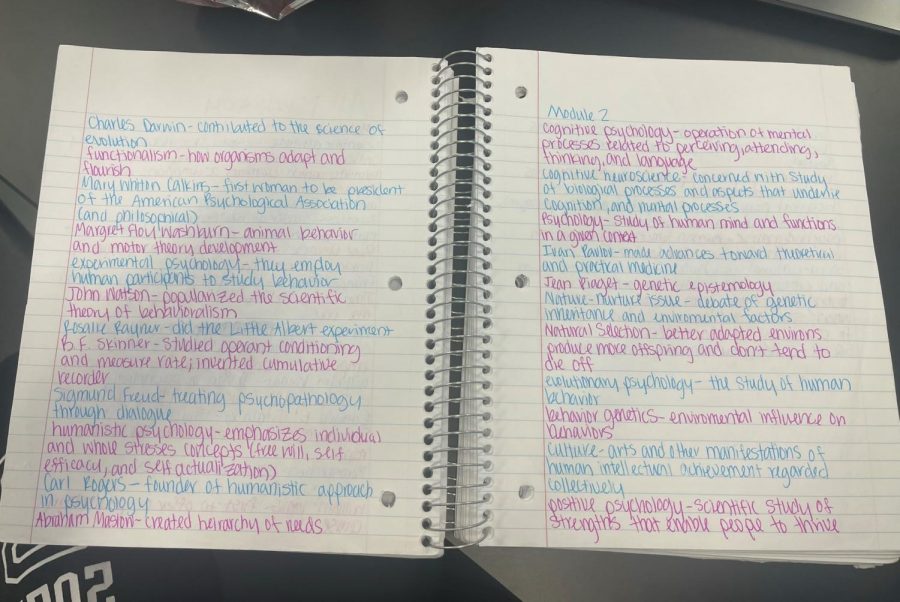For some, school might be a piece of cake, and for others it can be quite a challenge. Depending on the classes that students take, viewpoints on school can vary from person to person.
Advanced Placement (AP) classes are notorious for the amount of information and homework students are expected to complete. The quantity and quality of homework and classwork automatically makes teachers hold their AP students to a higher standard.
Taylor Bratcher is a senior who takes the AP Biology and AP Psychology courses. Her study habits involve a lot of repetition. “When I am studying for AP Biology, I repeatedly write down notes on a whiteboard, erase, and do it again,’ Bratcher said. “For AP Psych, I memorize my notes and explain them to my friends and family to help me fully understand the material.”
In general, using those studying methods ensures success for Bratcher. She puts forth the effort necessary when it comes to studying. Her goal in the future is to become a marine biologist, so she takes her AP classes seriously.
“If I don’t study, then my scores drop,these classes can be challenging and it is important that I maintain good grades,” Bratcher said.
For Bratcher, using tools like notebooks and whiteboards work best for her when it comes to memorizing information. “If a student is struggling in an AP class, I think they should try to constantly repeat studying and do it as often as possible,” Bratcher said, “Also try the whiteboard trick, and color-code your notes so it is not so difficult for your brain to reread.”
AP classes can be difficult, and can feel overwhelming for students, but do not take Bratchers advice with a grain of salt, these tips can really help. Her studying habits are effective no matter how stressful her classes can be.
On the other hand, students who take regular core classes can be put under the same stress as AP students.
Jill Fanning is a senior who is not taking any AP classes this semester. They have taken AP classes their junior year and honors classes their freshman and sophomore year, so they have had their fair share of experience in difficult courses.
“There’s a lot less work outside of school in regular classes than AP and honors classes,” Fanning said. “Regular classes still have you do the same types of things but there is less homework and in regular classes it’s at a slightly slower pace.”
Normal classes are more flexible with student needs and capabilities. They take more time to master skills, as AP classes take time to present skills.
Fanning also participates in many extracurricular activities. “I am in cross-country for two years, art club, one-act, lacrosse for six years,’ Fanning said, ‘I am also an ambassador for a youth climate organization called Zero Hour.”
With all of these responsibilities, Fanning also holds themselves to a high standard and sets expectations based on the amount of work they have to do. They also create plans for how to execute these expectations, especially when they study.
Fanning is subjected to a lot of stress when it comes to balancing all of their extracurriculars and school work. They prioritize studying and extracurricular activities in the same way. “Because I am in so many extracurricular activities, I usually try to get as much done during my school day as possible,” Fanning said, ‘especially during my study hall.”
Fanning puts a lot of time and effort into studying and uses multiple ways to memorize the material. “I usually complete my notes inside or outside of class, watch crash course videos so I can visually see what my teacher was talking about.I usually finish study guides or review guides before the quiz or test,” Fanning said.
Both of these seniors are hard working and strive to be the best student they can be. They hold themselves accountable and recognize the responsibilities of being a successful student in Elkhorn. Give their study habits a try and see what works the best, and practice what resonates.
All in all, the study habits of AP and honors students compared to students who take the normal courses vary. Regardless, repetition and organization are key components to effectively comparing for a test or a quiz.
Being a student is stressful, but understand the tools available to all students and use what works the best.











